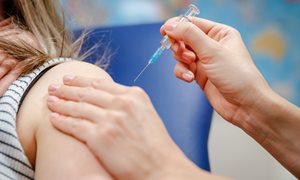
Following bariatric surgery, patients do not only lose fat but also muscle mass, even more than with a regular diet. The proportion of lost muscles can reach more than a third of the total weight loss. Such excessive loss is associated to future health problems such as an increased risk for heart conditions and even death. This is shown by Malou Nuijten from Radboud university medical center in her dissertation. Additional proteins and exercise may offer relief.
Obesity is a growing global problem, and the number of bariatric surgery procedures is on the rise. In the Netherlands, more than 12,000 of such surgeries are performed annually. Following this surgerical intervention, patients lose a significant amount of weight, but it is not just fat. Muscles also disappear, averaging eight kilograms per patient. This mainly occurs in the first three months after the operation, with significant variations among patients.
These conclusions were drawn by PhD candidate Malou Nuijten after examining literature and following assessment of 3,500 patients for three years after their bariatric surgery. ‘We observe that patients lose more muscle mass after a bariatric surgery than with a diet. In one out of seven cases, muscle loss is even more than a third of the total weight loss.’ Such an unfavorable ratio between muscle and fat loss is associated with future health problems, and above the age of 45 years, the researchers even see a higher risk of heart conditions and even death.
Strength Training
Losing too much muscle mass is unhealthy, but it's normal for people to lose some muscle mass when losing weight. ‘People who are overweight carry a lot of excess weight, and that is a kind of strength training for the muscles’, says Nuijten. ‘When they lose weight, fewer muscles are needed to support the lower body mass.’
It is challenging for physicians to predict who is most at risk of excessive muscle loss before the surgery. Nuijten and her team observed the most muscle loss in men, older individuals, and those with a higher BMI before the operation. However, Nuijten believes that other factors are also crucial, such as post-surgery behavior and genetic traits. Further research is needed to explore this in more detail.
Proteins
The two main factors that help to maintain muscle mass are proteins and exercise. The dissertation reveals that only a quarter of people consume enough protein after their bariatric procedure to maintain muscle mass. Nuijten: ‘There is no storage for protein in the body, so proteins must come directly from the diet. But after a bariatric intervention, the food intake is reduced, leading to a potential deficiency.’ The amount of protein per meal needs to be increased.
However, many people experience a change in the taste and smell of their food after bariatric surgery, making protein-rich foods such as meat less tolerable. This makes it challenging to consume enough proteins. ‘After a stomach reduction, people often eat five or six small meals per day. I advise them to consume enough proteins with each meal. It is wise to choose products enriched with protein, such as dairy products with extra protein’, explains Nuijten.
Walking
Exercise is also crucial for muscles. The research shows that people who exercise more after a bariatric surgery score better on body composition, fitness, and quality of life. Individuals can gradually build up their exercise routine after the operation. Especially walking is beneficial in the beginning. Once permitted, around six weeks after the surgery, people can start strength training.
Good guidance from healthcare providers appears to be crucial, especially in the first three months, with advice on a protein-rich diet and more exercise. Therefore, Professor of Physiology Maria Hopman and exercise physiologist Thijs Eijsvogels will launch a multi-center study later this year, with the help of healthcare providers. Eijsvogels: ‘Thanks to this dissertation, we know that excessive muscle loss is unfavorable for a patient. Now we will explore strategies to solve this.’
More information about this dissertation
Thesis defense on January 18, 2024 at 10.30 am by Malou Nuijten. Title thesis: Excessive fat-free mass loss following bariatric surgery. Not all weight loss is equal (online available after January 18). Promotors: Prof. Dr. Maria Hopman and Prof. Dr. Eric Hazebroek. Copromotors: Dr. Thijs Eijsvogels and Dr. Valerie Monpellier. The defense can be followed via this link.

PhD candidate Malou Nuijten
-
Want to know more about these subjects? Click on the buttons below for more news.
More information
Annemarie Eek

wetenschapsvoorlichter






